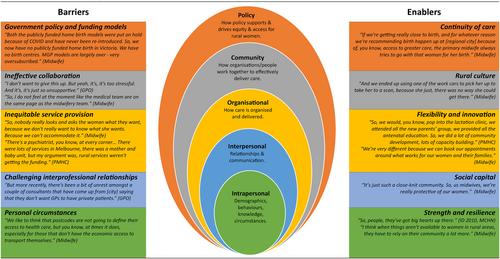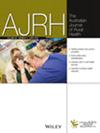Barriers and enablers to accessing perinatal health services for rural Australian women: A qualitative exploration of rural health care providers perspectives
Abstract
Objective
To identify perceived barriers and enablers for rural women in accessing perinatal care within their own community from the perspective of perinatal health care providers.
Design
A qualitative descriptive study design utilising reflexive thematic analysis, using the socioecological framework to organise and articulate findings.
Setting
Victoria, Australia.
Participants
Semi-structured interviews were conducted with nine perinatal health care providers who provide care to pregnant women or new mothers in rural communities. Participants were recruited across Victoria in 2023.
Results
Providers reported multi-level barriers and enablers that exist for rural women in accessing perinatal care within their communities. Barriers included women's personal circumstances, challenging professional relationships, inequitable service provision, ineffective collaboration between services and clinicians and government funding models and policies. Enablers included strength and resilience of rural women, social capital within rural communities, flexible care delivery and innovative practice, rural culture and continuity of care models.
Conclusion
Rural perinatal health care providers perceived that rural women face multiple barriers that are created or sustained by complex interpersonal, organisational, community and policy factors that are intrinsic to rural health care delivery. Several addressable factors were identified that create unnecessary barriers for rural women in engaging with perinatal care. These included education regarding health systems, rights and expectations, equitable distribution of perinatal services, improved interprofessional relationships and collaborative approaches to care and equity-based funding models for perinatal services regardless of geographical location.


 求助内容:
求助内容: 应助结果提醒方式:
应助结果提醒方式:


